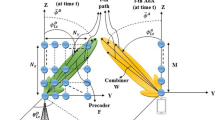Abstract
In wireless multiple input single output (MISO) systems, transmit beamforming using feedback of quantized channel state information (CSI) can provide both diversity gain and array gain with simple implementation. Most of previous researches include several ideal assumptions, such as block-fading channels, perfect CSI at the receiver, or error-free and zero-delay feedback link. This paper investigates a more realistic Jakes’ time-varying MISO Rayleigh fading channel with CSI estimation error and feedback delay, derives the upper and lower bounds on the ergodic capacity, and obtains the optimal frame length according to the capacity lower bound given the normalized feedback bits. The numerical and simulation results show that the derived upper and lower bounds on the capacity is quite close, increasing channel estimation error or Doppler spread will reduce the capacity bounds, and the optimal frame length can maximize the capacity lower bound.
Similar content being viewed by others
References
Andersen J B. Antenna arrays in mobile communications: gain, diversity, and channel capacity. IEEE Antennas Propag Mag, 2000, 42: 12–16
Narula A, Lopez M J, Trott M D, et al. Efficient use of side information in multiple antenna data transmission over fading channels. IEEE J Select Areas Commun, 1998, 16: 1423–1436
Love D J, Heath Jr R W. Grassmannian beamforming for multiple-input multiple-output wireless systems. IEEE Trans Inf Theory, 2003, 49: 2735–2745
Mukkavilli K K, Sabharwal A, Erkip E, et al. On beamforming with finite rate feedback in multiple antenna systems. IEEE Trans Inf Theory, 2003, 49: 2562–2579
Roh J C, Rao B D. Transmit beamforming in multiple-antenna systems with finite rate feedback: A VQ-based approach. IEEE Trans Inf Theory, 2006, 52: 1101–1112
Isukapalli Y, Rao B D. Finite rate feedback for spatially and temporally correlated MISO channels in the presentce of estimation errors and feedback delay. In: Proceedings of IEEE GLOBECOM, Washington DC, 2007. 2791–2795
Visotsky E, Madhow U. Space-time transmit precoding with imperfect feedback. IEEE Trans Inf Theory, 2001, 47: 2632–2639
Zhou S, Giannakis G B. Optimal transmitter eigen-beamforming and space-time block coding based on channel mean feedback. IEEE Trans Inf Theory, 2003, 50: 2599–2613
Simon S H, Moustakas A L. Optimizing MIMO antenna systems with channel covariance feedback. IEEE J Select Areas Commun, 2003, 21: 406–417
Au-Yeung C K, Love D J. On the performance of random vector quantization limited feedback beamforming in a MISO system. IEEE Trans Wirel Commun, 2007, 6: 458–462
Santipach W, Honig M L. Capacity of beamforming with limited training and feedback. In: Proceedings of IEEE Int Symp on Inform Theory (ISIT), Washington DC, 2006. 376–380
Ma Y, Zhang D. Error rate of transmit beamforming with delayed and limited feedback. In: Proceedings of IEEE GLOBECOM, 2007. 4071–4075
Jakes W. Microwave Mobile Communications. Washington DC: IEEE Press, 1994
Santipach W, Honig M L. Signature optimization for CDMA with limited feedback. IEEE Trans Inf Theory, 2005, 51: 3475–3492
Jindal N. MIMO broadcast channels with finite-rate feedback. IEEE Trans Inf Theory, 2006, 52: 5045–5060
Médard M. The effect upon channel capacity in wireless communication of perfect and imperfect knowledge of the channel. IEEE Trans Inf Theory, 2000, 46: 933–946
Yoo T, Goldsmith A. Capacity and power allocation for fading MIMO channels with channel estimation error. IEEE Trans Inf Theory, 2006, 52: 2203–2214
Huang K, Heath Jr R W, Andrews J G. Limited feedback beamforming over temporally-correlated channels. IEEE Signal Process, 2009, 5: 1959–1975
Ma Y, Leith A, Schober R. Predictive feedback for transmit beamforming with delayed feedback and channel estimation errors. In: Proceedings of IEEE Intl Conf on Commun (ICC), Beijing, 2008. 4678–4682
3GPP: Physical Layer Aspects for Evolved Universal Terrestrial Radio Access (release 7),. TR 25.814, 2006
Hassibi B, Hochwald B M. How much training is needed in a multiple-antenna wireless link? IEEE Trans Inf Theory, 2003, 49: 951–964
Alamouti S M. A simple transmit diversity technique for wireless communication. IEEE J Select Area Commun, 1998, 16: 1451–1458
Tarokh V, Jafarkhani H, Calderbank A R. Space-time block codes from orthogonal designs. IEEE Trans Inf Theory, 1999, 45: 1456–1467
Zhong E, Huang T. Numerical Analysis (in Chinese). Beijing: High Education Press, 2004
Author information
Authors and Affiliations
Corresponding authors
Rights and permissions
About this article
Cite this article
Zhang, L., Wu, G. & Li, S. Capacity bounds of transmit beamforming over MISO time-varying channels with imperfect feedback. Sci. China Inf. Sci. 53, 1417–1430 (2010). https://doi.org/10.1007/s11432-010-4003-z
Received:
Accepted:
Published:
Issue Date:
DOI: https://doi.org/10.1007/s11432-010-4003-z




